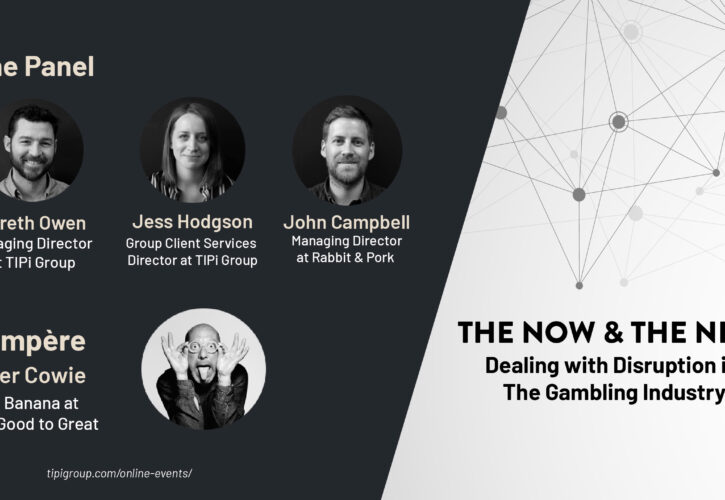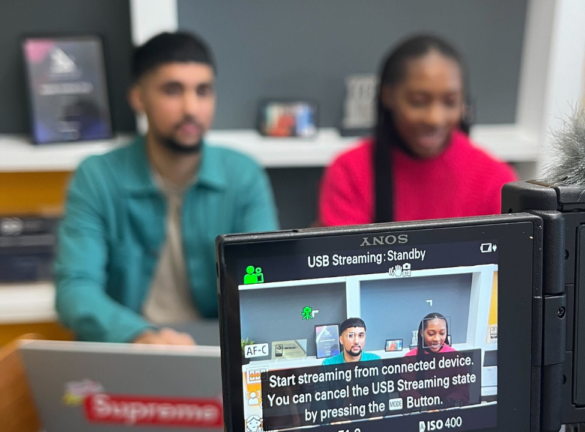
The Now & The Next: Dealing with Disruption in The Gambling Industry
Our fifth ‘The Now & The Next’ session delved into both the disruption of the current pandemic and the shifting landscape of the gambling industry. Peter Cowie (Top Banana at From Good to Great) sat down with three TIPi Group players, Gareth Owen (Group Managing Director at TIPi Group), Jessica Hodgson (Group Client Services Director at TIPi Group) and John Campbell (MD at Rabbit & Pork) to discuss how brands can win in a post-COVID world.
Peter Cowie: Lockdown begins, all betting shops shut, live sports gets the whistle blown on it, shortly after advertising is banned. I thought it spelled the potential death of an industry in the short term, Gareth did you feel the same?
Gareth Owen: Well the impact of no sport was always going to be felt by betting groups and they were forced to react with financial changes whether in terms of bonuses or headcount, but there was a counterbalance to this.
With people unable to bet on sports, they were being encouraged to gamble online, and while this couldn’t replace the revenue made from sports betting, it created a decent cushion and brought new customers into different forms of gambling.
However, regulation again comes in here as things like online casino comes with a risk of bigger losses and are more addictive than sports betting.
PC: TIPi Group’s recent whitepaper demonstrated suggested that new opportunities are arising to acquire a younger, more diverse audiences as players move into the digital environment, how do you think brands can do that?
GO: I think the industry needs to react in the main by aiming to create safer, but more accessible products.
By creating products and games which naturally encourage people to bet less but more socially with their peers (football accumulators as an example), they will ultimately attract the younger audience who still crave that dopamine hit and invest themselves in the game but don’t want to bet big.
PC: As the industry moves towards digital and the younger generation comes with it, we have seen the increasing role of e-sports. What have you noticed in this area?
GO: Well we’ve seen new entrants specifically focused on e-sports come to market, so the legacy industry players will need to start investing in specialists who’ll be able to understand the likely outcomes of a particular Fortnite player winning a tournament for example. I think we’ll also see much more cross-over between e-sports and regular sports as the boundaries between the two start to blur, as we saw with F1 drivers taking their races online.
PC: Jess, looking at the shift in the industry towards online, what are the opportunities from a strategic point of view for the gambling industry and beyond?
Jess Hodgson: These companies have a wealth of data on their customers which needs to be collected and used for planning moving forward. As betting increases from events such as Ascot and football returning, brands should take advantage of the data on user behaviour to inform their planning.
They should also consider focusing on their end-to-end customer journey, from landing on the site to completing user registration. Loyalty to one provider, especially amongst millennials, is low, so brands need to understand this and provide an experience which gives their users a reason to stay, from UX and functionality to the content of the site.
Typically gambling companies are mostly acquisition focused, but a lot can be done by looking at the available data on your current user base. Brands should think about how they can keep newly acquired customers from the lockdown period engaged and use pull-mechanisms to bring wavering customers back to their site.
PC: The changing landscape provides an opportunity to attract new players to the market, but gambling sites and gambling itself can seem complicated for the average user, do you see brands creating more accessible gambling products post-COVID?
JH: Absolutely, gambling can be complicated and many consumers are searching for simplicity, so brands have to ask how they can provide that.
One example of this is a Bet Calculator we built for a previous client’s website, which helped users to get the best value out of their money – by providing them with a simple asset which would show them what profits they would make from which combined bets, they kept them returning to the site to use it.
PC: Turning to our voice specialist John – as the market grows, voice is gaining greater penetration, but can you demonstrate how seriously the big tech players are taking voice?
John Campbell: Yes, well the three big players (Amazon, Apple and Google) are all investing heavily in voice and this is leading to quick growth. Google for example recently released figures recently stating that 500 million people are using the Google Assistant worldwide in 30 languages across 90 countries.
Predictions are that by 2023 there will be around 8 billion voice assistants in the world and with them, an economy of about $80 billion per annum generated, not only from selling the devices but selling products and services via voice.
Voice is seemingly everywhere, and the younger generation who are used to gaming with headsets, are starting to use companion apps, where the assistant can provide information on several things while they play.
This is prompting a new type of behaviour at home, where people utilise voice apps for quick facts whilst watching sport or gaming.
PC: At Rabbit & Pork (TIPi Group’s voice experience arm), you often workshop with clients to discover voice opportunities. Looking at the gambling world, what opportunities can you see?
JC: When we workshop with brands, firstly we interrogate whether we can get the smart speaker to answer a question which our brand is responsible for, website optimisation comes into play here.
Secondly, we look at scenarios which might be conducive to a voice interaction, for gambling brands this might be a user asking about the odds on a race or the upcoming matches in a day. In the workshops, we try to create sample scripts to work out whether a scenario might be quicker through voice, whether it’s possible with the data available, and how voice can enhance the current experience in the app.
Brands can’t currently use voice apps to place bets, so we would try to think of scenarios which can provide information in a quicker, friendlier manner that ultimately would bring a user from a voice experience through to an app.
PC: Looking from the now to the next, what is high on the agenda?
JC: On voice, smart speakers have grabbed the headlines and will be the means by which people become accustomed to using voice in general. However, voice is more than smart speakers.
Using the gambling industry as an example, natural language processing could be used to fill out bet slips, which would make an interesting addition to an app.
Further down the line, smart TV’s will make an interesting proposition combining voice search with visuals. Brands should consider skills and voice search as a starting point, but voice will go further than the current platforms.
PC: I recently interacted with a voice experience, where the voice was a that of a real person, rather than being digital, what do you see happening in this regard?
JC: Brands need to define the persona of their brand, KFC have led the way with this, creating a voice for their KFC Colonel in partnership with Amazon.
Brands who may not have a physical representation of their brand, might need one for future voice assistants and avatars. In the past, brands used actors or celebrities as brand advocates, brands in the future may choose to create a digital avatar which will in turn enable them to build millions of adverts programmatically tailored to specific individuals, creating so much more opportunity.
PC: Finally, Gareth, what are TIPi Group planning and what lessons have they learnt from this period?
GO: Consumer behaviour has irrevocably shifted towards digital, a lot of trends which were already in play have been supercharged lately. We are witnessing a shift towards the augmented world where people expect experiences to be facilitated by their mobile phone or smart speaker, interactions will become smoother and users will expect certain functionalities.
Brands will need to focus on tying together their physical and digital ecosystems, and ultimately, we’re here to help them succeed at that.
However, for us the main thing that has emerged from this period has been efficiencies in our ways of working, not just for how we work with each other but also for how we deliver impactful outputs for our clients.
Thank you to our panel of TIPi Group players for the insight-packed session. The recent TIPi Group Whitepaper referenced in the session is currently available for free download. You can find out more about the upcoming ‘The Now & The Next’ sessions and watch previous sessions on the TIPi Group events page.





